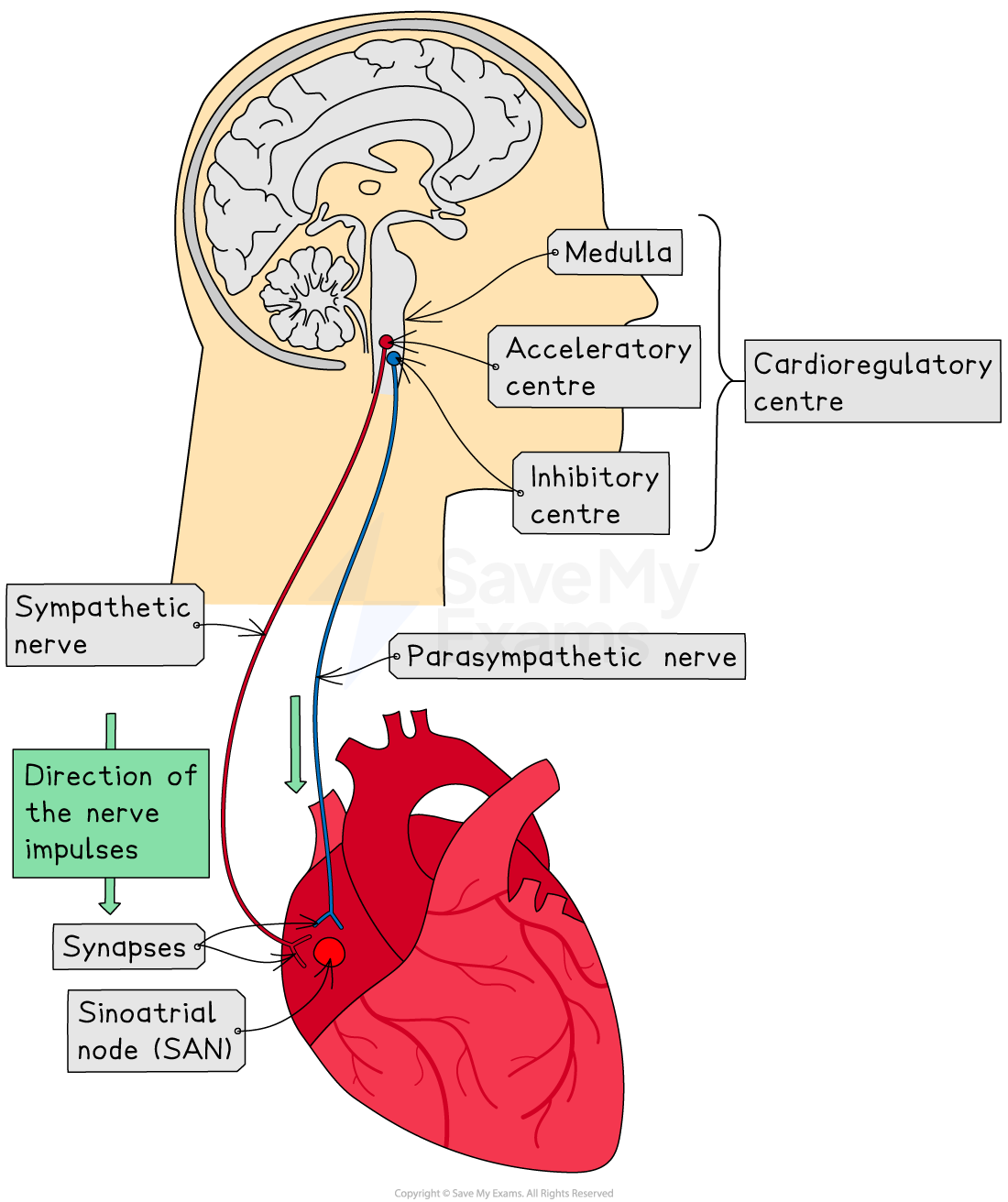Heart Rate (AQA A Level Biology): Revision Note
Exam code: 7402
Control of heart rate
While the initiation of the heartbeat is myogenic, there are times when heart rate needs to change from its baseline rate
E.g. during exercise
The autonomic nervous system
Heart rate is controlled by the cardioregulatory centre in the medulla of the brain, which is connected to the sinoatrial node (SAN) by nerves of the autonomic nervous system
The autonomic nervous system controls unconscious activities, such as heart rate, breathing rate and digestion; it has two branches:
the sympathetic branch is involved with 'fight or flight', e.g.:
increasing heart rate
increasing breathing rate
diverting blood flow to muscles
the parasympathetic branch is involved with 'rest and digest', e.g.:
slowing heart rate
slowing breathing rate
digesting food

Chemoreceptors and pressure receptors
Whether the medulla sends nerve impulses via a sympathetic or parasympathetic nerve depends on information from receptors in the blood vessels, e.g.:
chemoreceptors detect the carbon dioxide concentration of the blood
CO2 concentration affects blood pH, which is also detected by chemoreceptors
pressure receptors detect blood pressure
Stimulus and receptors | Changes in the nervous system | Heart rate |
|---|---|---|
Low blood CO2 detected by chemoreceptors High blood pressure detected by pressure receptors |
| Decreases |
High blood CO2 detected by chemoreceptors Low blood pressure detected by pressure receptors |
| Increases |

Examiner Tips and Tricks
Be careful not to confuse the roles of the SAN and the autonomic nervous system here:
The SAN initiates the heart beat
It can change its rate of initiation in response to stimulation from the autonomic nervous system
Investigating factors affecting heart rate
It is possible to investigate the effect of a named variable on an organism's heart rate, e.g. the effect of:
caffeine
alcohol
temperature
diet
dehydration
Investigating the effect of caffeine on heart rate in humans
Apparatus
Heart rate monitor, or stopwatch
Drinking water and a type of caffeinated drink, e.g. cola, energy drink or coffee
Measuring cylinders
Cups
Volunteers, with no heart conditions or caffeine sensitivity
Method
Divide volunteers into two groups
Measure resting heart rate for both groups by sitting quietly for 5 minutes before recording heart rate, e.g. by:
using a heart rate monitor
counting beats at the wrist for 30 seconds, then multiply by 2 to get beats per minute
Use the measuring cylinder to pour 200ml of a caffeine drink or water into a cup
Ask each individual to consume the drink
Group 1: caffeine drink
Group 2 (control group): the same volume of water
Wait 15 minutes
All volunteers should be resting during this time, and should not consume any other food or drink
Record the heart rates of each individual again
Repeat the heart rate measurements every 15 minutes for 2 hours
This will show the duration for which caffeine has an effect on the heart rate
Process the data, e.g.:
calculate the mean heart rate of each group
present the results in a graph form
calculate cardiac output
Cardiac output
Cardiac output is found by multiplying the heart rate by the stroke volume:
Cardiac output = heart rate x stroke volume
The equation can be rearranged to find the heart rate and stroke volume if required
Heart rate = cardiac output ÷ stroke volume
Stroke volume = cardiac output ÷ heart rate
Limitations
It is very difficult to ensure that variables other than caffeine consumption are controlled during this type of experiment, e.g. there may be differences between individuals such as:
different food consumed prior to experiment
different fitness levels
different responses to caffeine
taking part in the experiment may have unpredictable effects on heart rate
Using a large enough group of volunteers should help to reduce the problem described above, but this can be difficult in a school setting
Examiner Tips and Tricks
When writing designs for experiments like this one, you should always consider factors such as:
how control variables will be controlled
the importance of a control group (and how this differs from control variables)
how the results will be analysed, e.g. type of graph, appropriate statistical tests
sample size and repeats

Unlock more, it's free!
Was this revision note helpful?
